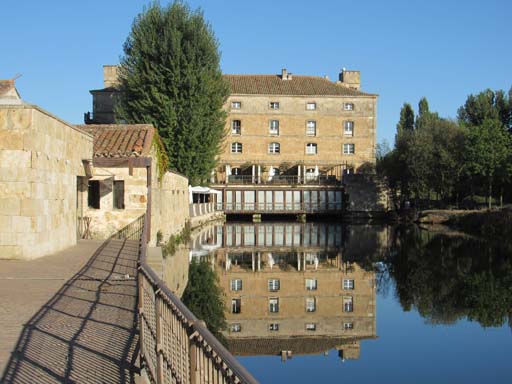We spent one night in the Hacienda Zorita outside Salamanca, a former monastery now converted to a hotel, vineyard, and farm. The hospitality included a tasting of Zorita’s own wines, followed by a supper of chicken and veg grown on the property. The breakfast the next morning was phenomenal: organic eggs, bacon and ham from the farm’s own stock, cream from the cows, bread from grain grown locally.
Back in the 15th Century, the monastery was where Christopher Columbus hung out waiting for royal permission to sail, which was duly delivered.
It’s interesting how present Columbus is in contemporary Spain, far more than he is in the States. We seem to meet him everywhere: his point of embarkation, his tomb, his many statues. Columbus Day is a national holiday. The controversy that has embroiled him in the US does not seem to have reached this far.
Spanish history is so sanguine that it’s hard to find any political figure without blood on his hands. Philip II is celebrated for establishing Madrid as the capital and for his building and administrative projects, not for the number of heretics he burned and slaughtered in the Low Countries, or the number of Africans enslaved. The Catholic Kings, Ferdinand and Isabel, are famous for reuniting the country, not for expelling 30,000 Jews or unleashing Torquemada on the population. Columbus is celebrated for some things, not for others.
You have to pick your heroes carefully.

There was a made-for-TV movie years ago, 1984 if memory serves. It was a version of The Scarlet Pimpernel. Anthony Andrews as Sir Percy, Jane Seymour as Marguerite St. Just, Ian McKellan as Paul Chauvelin. Other well known figures from British theatre. A fun movie.
At one point, Sir Percy and Paul Chauvelin are both courting Marguerite, and see each other as romantic rivals. They encounter each other, and Sir Percy apologizes for being late, because in the society of Revolutionary France, no one wants to do the driving anymore.
Paul asks, “You do not approve of our new society, then?”
Sir Percy replies, “Approval, sir – in my opinion – requires the attainment of perfection. And in that sense you rather overrate the charm of your new society.”
I’ve expressed this thought in several online fora. “Approval requires the attainment of perfection.” If we believed that, we might as well stop trying to approve of anything and anyone, because nothing and no one is perfect.
There is no famous historical figure who has not committed some kind of transgression against what we, in our more enlightened days, consider inappropriate, incorrect, wrong, or horrific.
Should we stop honouring figures from the past, then? Honour, sirs, ladies and others – in my opinion – requires the acknowledgement of the good that was done as well as admitting the wrongs that were done. And in that sense, we can then learn from both the positive and negative of history, and reflect on our choices of who we choose to honour.
Comments on this entry are closed.